- Home
- Mark Batterson
Whisper Page 18
Whisper Read online
Page 18
The oldest book of the Bible is Job, and Job’s life is the epitome of pain and suffering. Job lost his family to a catastrophe. He lost his wealth and his health. Worst of all, he lost hope. He was a defeated man and eventually asked God to end his life. But even in the most calamitous circumstances, he had a very thin thread of joy: “I would still have this consolation—my joy in unrelenting pain—that I had not denied the words of the Holy One.”6
The New American Standard Bible says, “I rejoice in unsparing pain.”
The Holman Christian Standard Bible says, “I would leap for joy in unrelenting pain.”
The English Standard Version says, “I would even exult in pain unsparing.”
This Hebrew word for “joy” appears only once in Scripture—it’s rare joy, extreme joy. It’s a joy that doesn’t deny reality, but it does defy it. It’s triumphant elation in the face of staggering loss. The most literal translation is this: “to leap like a horse so stones spark.”7 It’s not just jumping for joy; it’s dancing on disappointment.
Somehow Job took a small measure of pleasure despite the pain. Would he have changed the circumstances if he could have? In a heartbeat. But Job found joy in one simple fact: he didn’t deny the words of the Holy One.
In the midst of tough times, we may feel as if the Almighty has turned His back on us. So what do we usually want to do? We tend to turn our back on Him. But that’s when we need to lean in and lean on Him. And that’s what Job did. He didn’t cut God off; he didn’t stop listening.
Can I challenge you to do the same?
Perhaps God is saying something that can’t be heard any other way.
This is the toughest chapter for me to write, and it’s probably the toughest one to read. Pain isn’t pleasant. But C. S. Lewis was spot-on: “God whispers to us in our pleasures…but shouts in our pain.”8
Please hear me. Every pleasure known to man is a gift from God.
Sex? God’s idea.
Food? God’s idea.
Recreation? God’s idea.
Those pleasures turn into pain when we misuse and abuse them, but make no mistake, every pleasure in its purest form is a gift from God. Yes, we can turn them into sinful pursuits when we try to meet legitimate needs in illegitimate ways. But pleasure is a gift from God nonetheless. He whispers through those pleasures, and we should give thanks for them. But we better pay close attention to pain too.
The Gift of Pain
Before we go any further, dare I mention that pain can be a gift? Without pain we would repeatedly reinjure ourselves in the same ways. Without pain we would simply maintain the status quo. Without pain we would ignore problems that can kill us.
In fact, pain saved my life on July 23, 2000. I woke up that Sunday morning with intense pain in my abdomen, but I ignored it. I tried to preach a sermon that Sunday, but it became the only sermon I didn’t finish. Five minutes into it I was doubled over in pain. I ended up in the emergency room at Washington Hospital Center, where an MRI revealed ruptured intestines. I was immediately wheeled into surgery, where I could have and perhaps should have died. And I certainly would have died if it weren’t for the intense pain I could not ignore.
I was on a respirator for two days, fighting for my life. I lost twenty-five pounds in seven days. Trust me, there are better ways to lose weight! And the net result is a foot-long scar that bisects my abdomen from top to bottom.
Sometimes the greatest joy follows the worst pain, as mothers of newborns can attest. Few people inflict more pain on themselves than athletes, but the pain is forgotten in the thrill of victory.
Would I want to experience another brush with death like that? Not on my life! But I wouldn’t trade it for anything in the world. I don’t take a single day for granted. And the presence of God during those difficult days was as real as anything I’ve ever felt. It’s a presence that is felt and a voice that is heard most clearly during pain.
Remember Joseph in the Old Testament? He had zero emotional intelligence as a teenager, which isn’t entirely uncommon. But thirteen years of suffering earned him a graduate degree in empathy. And it was one act of empathy—noticing a dejected look on the face of a fellow prisoner—that eventually led to saving two nations.
Pain can be a professor of theology.
Pain can be a marriage counselor.
Pain can be a life coach.
Nothing gets our full attention like pain. It breaks down false idols and purifies false motives. It reveals where we need to heal, where we need to grow. It refocuses priorities like nothing else. And pain is part and parcel of God’s sanctification process in our lives.
Many lead actors and actresses in Scripture endured dark nights of the soul. Job lost everything. Sarah wrestled with infertility. Moses was a fugitive for forty years. David had a father-in-law who tried to kill him. Mary Magdalene was demon possessed. Peter struggled with self-doubt after he denied even knowing Jesus. And Paul had memories of murder seared into his soul. They also had one thing in common: they heard God’s whisper in their darkest hours. And they all came out the other side by His grace.
My prayer for you isn’t that you’d be pain-free; it’s that you’d learn to discern God’s loving voice in the midst of the pain. Is there a lesson He is trying to teach you? Is there some part of your character that can’t be cultivated any other way?
I’m certainly not suggesting that all pain is caused by God. Pain is a result of the curse, and it’s most often a symptom of sin. But sometimes it’s a gift from God. It’s the language that can’t be ignored. You can leave the Bible on your bedside table untouched. You can ignore desires, dreams, doors, promptings, and people. But you can’t ignore pain, can you?
If you will stick with me through the next few pages, I promise that the following statement will make more sense: pain can be a gift from God that He uses for His glory and our good. He uses it to get us out of addictive behaviors. He uses it to get us out of adverse situations. He uses it to get us out of abusive relationships. Take note and get out.
The miracle that Jesus repeated perhaps more than any other was the healing of lepers. Have you ever stopped to consider what that miracle accomplished? Among other things, He was restoring their sense of touch. One curse of leprosy is the loss of feeling. Lepers can’t feel pain or pleasure. They become numb to the physical world around them, and that’s a dangerous way to live. So Jesus gave them the gift of touch again, a gift that includes both pleasure and pain.
Growing Pains
The expression “No pain, no gain” is older than you might imagine. It didn’t originate with Jane Fonda’s workout videos in the 1980s. It dates back to a second-century Jewish rabbi who said, “According to the pain is the gain.”9
Let’s be honest. Most of us prefer this philosophy: no pain, no pain. We opt for the path of least resistance, but that doesn’t get us where God wants us to go. I’m certainly not suggesting that we need to seek out pain. Pain will find us soon enough. But when pain comes, we shouldn’t try to go around it. Instead, we need to go through it and learn to discern what God is saying through pain, through grief, and through suffering.
If it serves a higher purpose, pain can actually produce a measure of pleasure. When God answered my bravest prayer and healed my asthma, I decided to celebrate and validate that healing miracle by training for my first marathon. The eighteen-week training plan is one of the hardest things I’ve ever done. I basically inflict more and more pain on myself by running longer and longer distances. But when I cross the finish line of the Chicago Marathon, the pain will be in the past. The memory of that accomplishment, however, will last forever.
When I work out, one of my soundtracks is the training montage from Rocky IV. It helps me get a few extra reps, a few extra steps. I’ve seen the movie so many times that I can picture Rocky Balboa running up a snow-covered mountain. Rocky saws wood, splits logs. He does do
gsled bear crawls and walking lunges with a wooden beam through waist-deep snow. He does Roman chair sit-ups in an old barn, core work with an ox yoke, and the shoulder press with a horse carriage. Basically the same as your workout routine, right? Or not. But how else are you going to beat Ivan Drago?
Do you remember the two-word mantra repeated by Rocky’s trainer, Duke, over and over again? I sometimes hear it in my head when I hit the wall during a workout. Four times in the barn and two times in the ring, Duke says, “No pain, no pain, no pain!” I don’t think it’s a denial of the excruciating pain that Rocky is inflicting on himself; it’s a reminder that there is purpose beyond the pain. There is victory on the other side.
You can get through just about anything if there is a light at the end of the tunnel. And for a follower of Christ, there always is. But here’s my caution: don’t be so focused on getting out of difficult circumstances that you don’t get anything out of them. Sometimes the circumstances we’re trying to change are the very circumstances God is using to change us. So before you take a painkiller, listen carefully to what God is saying during the tough times.
That brings us back to Job and a few overarching lessons.
First, let’s not pretend that pain doesn’t exist. Whatever you do, don’t fake it to make it. That doesn’t do anybody any favors. It’s okay to not be okay! That admission is the first step in the healing process. Generally speaking, Americans aren’t good at sackcloth and ashes. But there is an appropriate time to tear your robe in grief, shave your head, and fall to the ground in worship.10 When we fail to grieve, wounds remain open. Grieving is part of the healing process. It’s an emotional antiseptic that cleans the wound. And different people grieve in different ways, so please give others a little latitude.
Second, let’s not explain pain away with trite truisms. It’s worth noting that Job’s friends were a great comfort to him as long as they kept their mouths shut. When someone is suffering or grieving, we feel pressure to say the right words. My advice? Say less and listen more. You can say a lot by saying little.
Dark Night
Mother Teresa devoted her life to loving the sick, the poor, and the dying in the slums of Calcutta, India. In 1979 she was awarded the Nobel Peace Prize. In 2003 she was beatified by the Catholic Church. With those kind of accolades, it’s easy to think of her as existing in a category by herself: beyond doubt, beyond discouragement. But Mother Teresa’s private diaries tell a different story. She wrote, “I am told God lives in me—and yet the reality of darkness and coldness and emptiness is so great that nothing touches my soul.”11
That sounds a little like Job, doesn’t it?
Even Jesus said, “My God, my God, why have you forsaken me?”12 When Jesus was on the cross, he felt farthest from the heavenly Father, yet that is when He was closest to accomplishing God’s purposes. We shouldn’t be deceived. When it seems as if God is letting us down, He is setting us up for something that may be beyond our ability to comprehend at the present moment.
I don’t know if this is heartening or disheartening; maybe it’s a little bit of both. If Mother Teresa wasn’t immune to dark nights of the soul, we probably won’t be either. Since Jesus had moments when the Father felt distant, we probably will too. May I offer a reminder? Faith isn’t flying above the storm; it’s weathering the storm. It’s trusting God’s heart even when we can’t see His hand. It’s understanding that sometimes the obstacle is the way!
If you want to know where God will use you, you need look no further than your pain. We help others in the places where we’ve been hurt. Our trials become our platforms. And our weakness is actually our strength because that’s where God’s power is made perfect.13
If Job endured “long and weary nights” and “months of frustration,”14 there’s a good chance we will too. But like him, we can come out on the other side more blessed than before.
The LORD blessed the latter part of Job’s life more than the former part.15
Can I be so bold as to believe that for you and me?
I can’t promise our lives will be pain-free, and I wouldn’t promise it if I could. But I can promise that He who began a good work is going to carry it to completion.16 I can also promise that in His presence is fullness of joy.17 But our spiritual journeys are anything but linear. They are full of zigs and zags, ups and downs. And it’s often two steps forward, one step back. Yet God never stops loving us through every season of life.
God is working out His plan, whether we know it or not. But we have to work out our salvation “with fear and trembling.”18 And by “work out,” I’m thinking Rocky Balboa in Russia. God’s gifts are free, but they aren’t easy. The Promised Land was God’s gift to His chosen people, but they still had to fight giants to take the land. You will too. And like them, you’ll acquire some battle scars.
Pain is part of the curse, but that doesn’t mean God can’t redeem it, recycle it, and speak through it. It’s a difficult language to discern, no doubt. But like every other language, it’s a love language. And we dare not forget that we have a suffering Savior, who endured the cross for the joy that was set before Him.19
Pain in pursuit of a godly goal is endurable, as evidenced by the Cross. The most excruciating pain wasn’t produced by a cat-o’-nine-tails20 or seven-inch spikes;21 it was the full weight of sin on His sinless shoulders. He who knew no sin became sin for us,22 and one thing sustained him: you. Yes, our sin put Him there. But His love for us kept Him there. Simply put, you are worth the Cross to Christ. And if He was willing to hang on His cross, we can certainly carry ours! The Word of God chose to die the most excruciatingly painful death to whisper His love to us loud and clear.
The Shadow of Death
Congresswoman Jaime Herrera Beutler and her husband, Dan, couldn’t wait to hear their baby’s heartbeat. It was a routine prenatal checkup, but the look on the sonographer’s face told them something was wrong, terribly wrong. That’s how they discovered that their baby girl had Potter sequence, a rare disease in which a lack of amniotic fluid inhibits lung development. Jaime’s baby had the most severe sort of sequence: bilateral kidney failure. Jaime was told that if she didn’t terminate the pregnancy, she would miscarry, or the baby would be stillborn or would suffocate in her arms after birth.
Nothing prepares you for news like that.
What do you do when your doctor tells you that the chance of your baby surviving is zero? That your baby’s disease is 100 percent fatal? That there has never been an exception to that prognosis?
While the doctor was delivering the news, Jaime felt her baby move. “To me that was a sign. I was not going to be the one to end this pregnancy,” she said. Despite the 100 percent fatality rate, Dan and Jaime decided to give God the full pregnancy to perform a miracle. They also got a word from God in the Word of God.
Nothing will drop parents to their knees like a sick child, and that’s precisely what happened to David after his affair with Bathsheba. He was picking up the pieces of his own shame when he got the news that his son was deathly ill. What did David do? He contended with God for the child. There isn’t a happy ending to this Bible story. For seven days David put on sackcloth and didn’t eat. Yet despite his best efforts, David’s son died seven days later.23
Jaime and Dan decided to contend for their baby. In retrospect, they call it their “contending season.” Their inclination was to grieve, but they fought any feeling of hopelessness. And if you find yourself in similar circumstances, I’d challenge you to follow suit. In Dan’s words, “Don’t rob God of the opportunity to do a miracle.”
Not long after announcing that their unborn baby had Potter sequence, USA Today ran a feature story about the Beutlers and their baby. Rob Volmer, a public-relations professional who doesn’t normally read USA Today, happened to spot that article in a hotel lobby while waiting for a client. The article caught Rob’s attention because he and his wife had a baby
with a similar syndrome whose life was saved by amnio infusions of saline.
Random, right? Wrong! God is big enough to speak through newspaper articles. He is big enough to connect complete strangers. In this instance He did both.
Rob made contact with a mutual acquaintance and then with Jaime. He put the Beutlers in touch with Dr. Jessica Bienstock, a perinatologist at Johns Hopkins Hospital in Baltimore, Maryland. Dr. Bienstock was not optimistic when she saw the first ultrasound because of the baby’s apparent deformities, but one week after the initial amnio infusions, the misshapen head, clubbed feet, and tiny chest looked normal.
There was a glimmer of hope. And in Dan’s words, “The difference between 0 percent hope and .00001 percent hope is enormous.” For the remainder of the pregnancy, Jaime and Dan lived in the valley of the shadow of death, but they pitched their tent in the land of hope.24 They kept contending until July 11, 2013, the day their baby girl was born, two months premature. Abigail weighed in at two pounds, twelve ounces. But she let out a cry, and you can’t cry if your lungs don’t work! Jaime’s first thought? That’s our miracle!25
Contending Season
When you get a diagnosis that is difficult to digest or a dream turns into a nightmare or your marriage is tearing apart at the seams, you have choices to make. You can stand down, or you can stand on the promises of God. You can give up by giving in to guilt or fear or anger, or you can contend by praying as though it depends completely on God and working as if it depends completely on you.
For Jaime, contending meant waking at four o’clock in the morning for trips to Baltimore for infusions, followed by long days in Congress. For Dan, contending meant putting law school on hold to manage Abigail’s nightly dialysis and eventually giving her one of his kidneys.

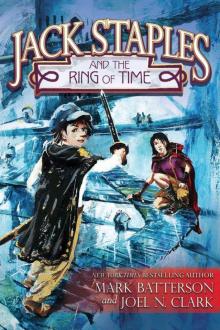 Jack Staples and the Ring of Time
Jack Staples and the Ring of Time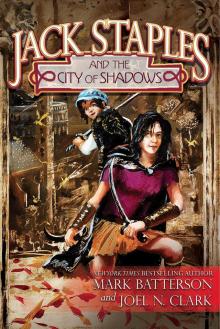 Jack Staples and the City of Shadows
Jack Staples and the City of Shadows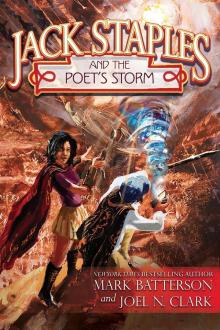 Jack Staples and the Poet's Storm
Jack Staples and the Poet's Storm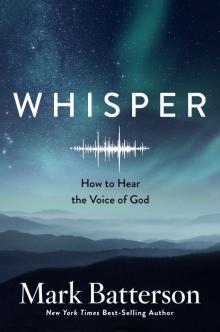 Whisper
Whisper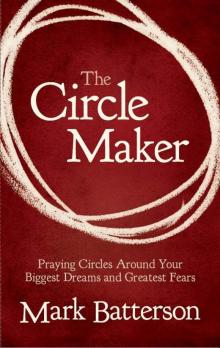 The Circle Maker_Praying Circles Around Your Biggest Dreams and Greatest Fears
The Circle Maker_Praying Circles Around Your Biggest Dreams and Greatest Fears